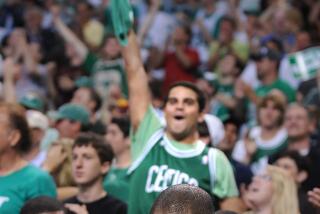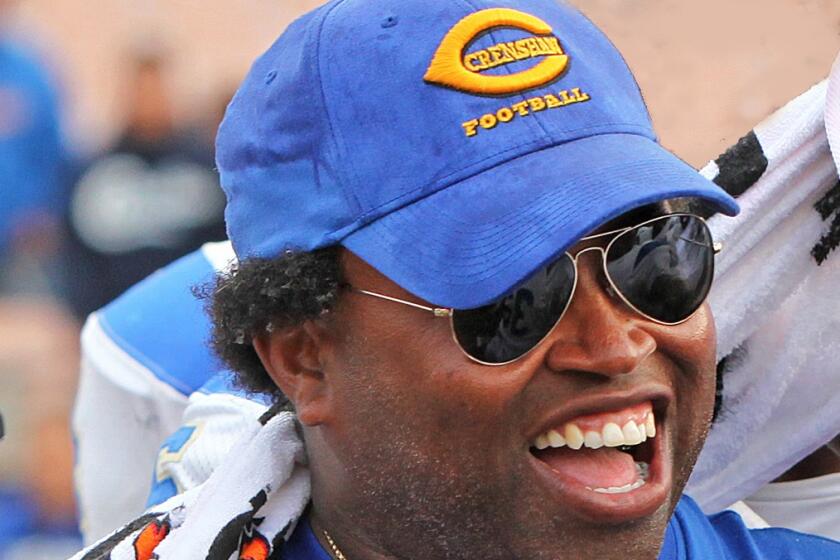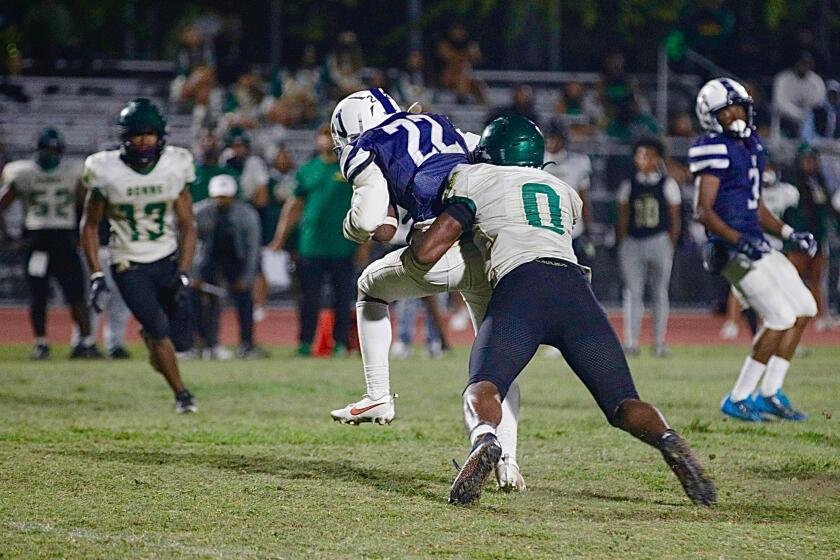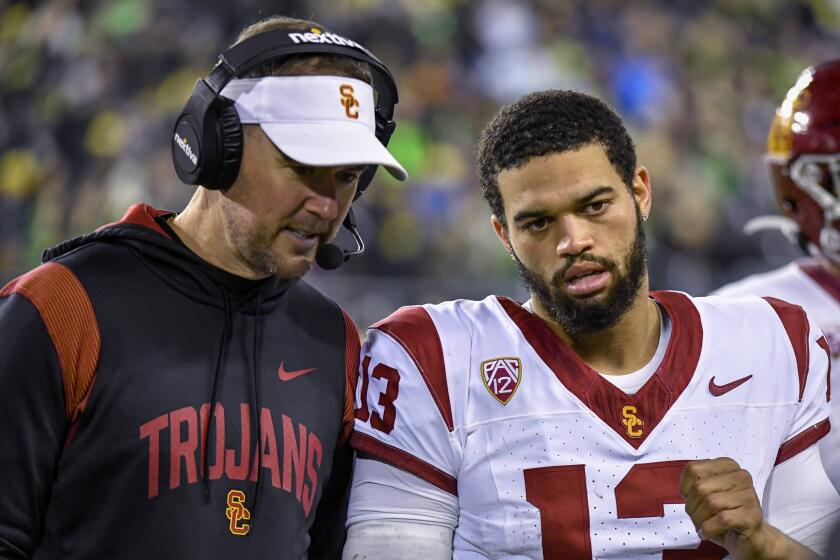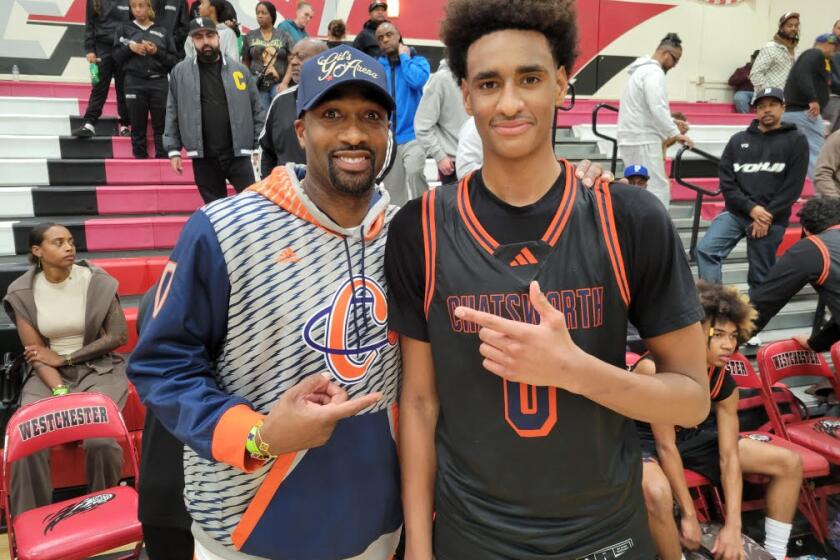Despite Stanley Cup drought, Canada isnât fully embracing the Canucks
Canada prides itself on having invented hockey, and it sometimes seems this vast country is united only by its passion for a game that mixes finesse with fisticuffs and celebrates players who carry on through the pain of separated shoulders and bashed-in noses.
Canada still produces more than half the players in the National Hockey League â the number has recently hovered around 53% â but no team based in Canada has won the Stanley Cup since the Montreal Canadiens defeated the Kings in 1993. Four of Canadaâs six teams have lost in the Cup finals since then: the Vancouver Canucks in 1994, Calgary Flames in 2004, Edmonton Oilers in 2006 and Ottawa Senators against the Ducks in 2007.
So it would seem logical that Canadaâs Cup-starved fans would back the Canucks over the Boston Bruins when the Cup finals start Wednesday at Vancouverâs Rogers Arena.
Not so much.
The Canucks are getting great support in Vancouver, where cabs bear team placards, people wear team jerseys on busy downtown streets and prices for tickets through online resellers are averaging more than $1,000 per seat. But the Canucks arenât the popular choice across the country despite being the last team from Canada standing.
âItâs a complex thing,â said David Fransen, the consul general for Canada in Los Angeles and an avid hockey fan.
âItâs tough because in Ontario you can be fans of Toronto, Detroit, Buffalo or Montreal and places beyond. In Alberta youâre a fan of the Oilers or Flames, and at what point do you transfer that loyalty to Canada?â
For some fans that point hasnât arrived.
Columnist Joe OâConnor wrote in the National Post that cheering for the Canucks, who had the NHLâs best record this season, âis like rooting for the New York Yankees: it cheapens the thrill. ⌠Are we that hungry? Me? Iâd rather starve, or wait, at least until the next Cinderella story comes along.â
An editorial in the Toronto Sun that called the Cup finals âthe greatest two weeks on the Canadian calendarâ noted that many fans havenât adopted the Canucks. âCanât say as we blame them. The reason is simple. Itâs not their team. In fact, it would also be a safe bet more Canadians will be rooting for the Boston Bruins than cheering for Vancouver, even if both have 17 Canadians on their roster.â
Why the hate?
Jealousy is a likely factor. Vancouverâs mountain and sea vistas make it one of the worldâs most beautiful cities, and it has milder winters than the rest of Canada. Its success in hosting the Winter Olympics has given it new prominence internationally, too. Is it fair for Vancouver to have all that and the Stanley Cup too?
âVancouver is now a place that is identified as having come of age and has a newfound sense of pride. Itâs unapologetic pride in its excellence. In the past thereâs been a tendency to be modest and even timid,â Fransen said.
Some of the weak support stems from geography. The Canucks play most of their games while the more populous Eastern part of Canada is sleeping and their players arenât as familiar as those in Toronto or Montreal.
Tradition also plays a part. Canadaâs easternmost Maritime provinces have ancient ties to Boston through seafaring industries. And some fans respect the Bruins as one of the leagueâs âOriginal Sixâ teams and see the Canucks, who joined the NHL in 1970, as lacking in history.
âThis is kind of a different country on this side of the mountains,â said Cam Cole, a columnist for the Vancouver Sun and six-year resident of Vancouver. âPeople look at it as tree-hugging, marijuana-smoking weirdoes out here. Itâs a strange world that nobody considers exactly like the rest of Canada.
âThe other thing is they play so late that if youâre watching youâre kind of half paying attention. The center of the universe based on East Coast,â he said, poking fun at Torontoâs self-importance, âand the whole national perception is formed by that. Thereâs not the same adoration as there is for Montreal or, God help us, Toronto.â
Canucks forward Alexandre Burrows said he and his teammates want to win for each other, the organization and Canucks fans. âWhat happens outside doesnât impact my preparation or the way Iâm going to feel if I win the Cup or if I donât,â he said Tuesday.
âItâs nice to bring the Stanley Cup to Canada because Iâm Canadian. But at the same time I really donât care a whole lot about what people in Calgary or Edmonton or Quebec think.â
Roy MacGregor, a much-honored columnist for the nationally distributed Globe and Mail, said hockey fans in Canada remain âhyper-sensitiveâ to the fact the Cup hasnât been won by a Canada-based team for so long. He said Vancouverâs distance from Eastern-based media works against the Canucksâ popularity more than the fact their top two players â twins Henrik and Daniel Sedin â are Swedish and that standout center Ryan Kesler is American.
Most Canadians, MacGregor said, âjust arenât that familiar with the players. No one knew anything of Kevin Bieksa, for example. And Roberto Luongo has this huge national rep of not winning the big games, despite his Olympic win right there in Vancouver.â
Had the Tampa Bay Lightning won the Eastern Conference championship instead of the Bruins, MacGregor said, French-Canadians would have backed the Lightning because of French players like Martin St. Louis and Vincent Lecavalier.
Personal connections like that influence rooting interest. Fransen has long been a friend of Bruins General Manager Peter Chiarelli, who was an agent before becoming a club executive. Chiarelli represented Fransenâs son, Aaron, who played major junior hockey.
âAll that said, in the end I donât think anything trumps the fact that hockey is our national religion. Nothing binds Canada together the way hockey does,â Fransen said.
MacGregor thinks the rest of Canada could be persuaded to back the Canucks.
âI think the country is warming to the idea,â he said, âbut it will take some early success in the final for them to leap aboard the bandwagon.â
twitter.com/helenenothelen
More to Read
Go beyond the scoreboard
Get the latest on L.A.'s teams in the daily Sports Report newsletter.
You may occasionally receive promotional content from the Los Angeles Times.


